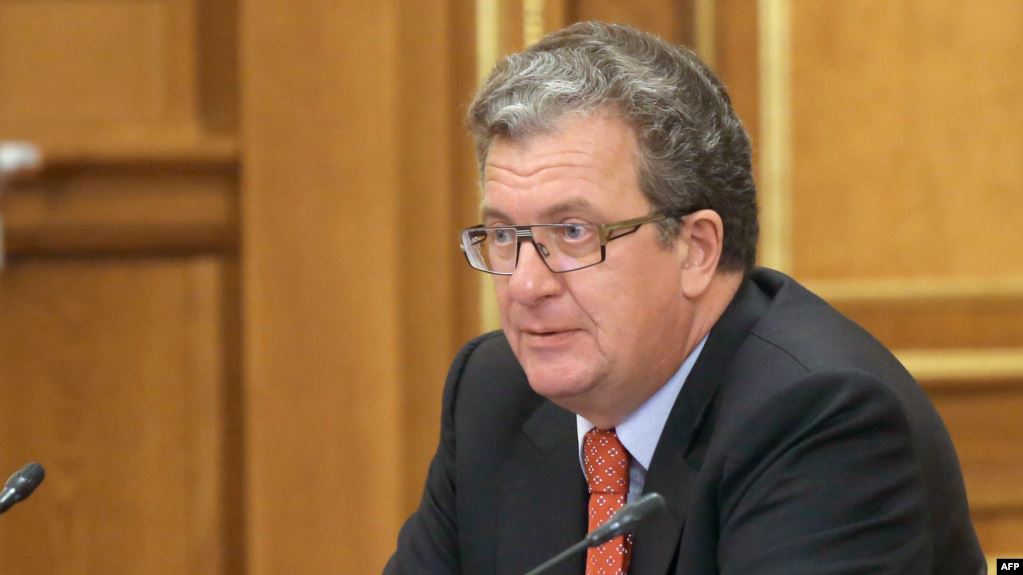While the Nord Stream 2 underwater gas pipeline from Russia is being constructed, officials in Moscow say they are willing to continue export operations to Europe via the decades-old overland route that passes through Ukraine.
“As for the transit of Russian gas through the territory of Ukraine, we are ready to save it on economically viable terms, but in case of a fair settlement of all legal disputes between PJSC Gazprom and NJSC Naftogaz of Ukraine,” TASS quoted first deputy head of the Russian government office Sergey Prikhodko as saying on Monday.
Prikhodko was referring to a dispute between Russia’s Gazprom and Ukraine’s Naftogaz, that has been ongoing for three years. In February, Gazprom was required to pay $2.6 billion, due to a breach in a 10-year contract signed by the two sides in 2009 for the transmission of gas from Russia to and through Ukraine. Gazprom appealed the arbitration board’s decision, hoping for a reversal of the decision, which was made by Stockholm Arbitration.
Meanwhile, Naftogaz has made attempts to enforce the arbitration ruling by trying to seize Gazprom assets in Europe as a form of payment for the $2.6 billion, which include assets allocated for the Nord Stream-2 project. The Ukrainian government has fiercely opposed the construction of Nord Stream 2, which would deliver 55 billion cubic meters (bcm) of Russian natural gas to Europe.
But Prikhodko said Nord Stream 2 does not jeopardize Ukraine' and other countries' current gas transit.
“Russia has repeatedly stated its readiness to maintain gas transits via the Ukrainian gas distribution system after 2019 based on the mutually acceptable terms,” Prikhodko told journalists. “In order to achieve this aim, it is necessary to coordinate relations between the involved companies, agree on economic conditions and to form an atmosphere, which would provide for a civilized dialogue.”
The $11 billion project, which is being built by a consortium of western European energy companies such as Austria’s OMV, the Anglo-Dutch company Shell; France’s Engie; and Germany’s Uniper and Wintershall, has faced furious opposition from Ukraine, fearing it will deprive Ukraine of the transit revenues.
Despite the denials of the Kremlin, Ukraine and some of the Western countries believe that Russia will use the Nord Stream 2 project as a political tool that will increase Europe's dependence on Russia’s energy supplies.
Prikhodko stressed that amid Europe’s growing energy demands, Moscow set a goal to diversify its supply routes using new or existing infrastructure that represents the best option, in terms of economic attractiveness and feasibility.
“The new gas pipeline will ensure stable and profitable supplies of Russian gas along the shortest route from fields on Yamal to consumers in Europe,” said Prikhodko.







 Azerbaijan and Armenia started the process of demarcation of their border on Tuesday, with the installation of the first border markers based on ge...
Azerbaijan and Armenia started the process of demarcation of their border on Tuesday, with the installation of the first border markers based on ge...
 Armenian sappers commenced on Monday mine-clearance operations in the territories adjacent to the Saint Mary Church in village of Voskepar (Armenia...
Armenian sappers commenced on Monday mine-clearance operations in the territories adjacent to the Saint Mary Church in village of Voskepar (Armenia...
 Iran has refuted reports of alleged damage to Shimon Peres Negev Nuclear Research Centre located southeast of Dimona, Israel, during the recent air...
Iran has refuted reports of alleged damage to Shimon Peres Negev Nuclear Research Centre located southeast of Dimona, Israel, during the recent air...
 Iran’s Foreign Minister, Hossein Amir-Abdollahian, has labeled a foiled Israeli drone attack in certain parts of the country as a "failure" for Isr...
Iran’s Foreign Minister, Hossein Amir-Abdollahian, has labeled a foiled Israeli drone attack in certain parts of the country as a "failure" for Isr...



